Jeff Garrison
Mayberry and Bluemont Churches
December 27, 2020
Isaiah 64
At the beginning of worship, in preparation:
Jesus’ birth came at an interesting time. Luke provides the historical setting: Augustus ruled as emperor, Quirinius was governor, and a major census was underway. On one hand, it was a time of stability. But the peace was fragile, maintained by terror and force, as I pointed out last week.
In Simply Jesus, N. T. Wright tells Jesus’ story by delving into the background of this world. As an analogy, he draws upon the story of the fishing trawler, Andrea Gail. If you read the book or seen the movie, you’ll remember she was lost in the North Atlantic during a storm created by the confluence of three weather systems: The Perfect Storm.
This first century perfect storm involved the confluence of the Roman world. Their infrastructure provides the means for the message to get out after Jesus’ resurrection. Second, the Jewish world longed for the Messiah and hated the Romans, which set up conflict. The sovereign wind of God was the third “storm,” challenging everyone’s assumptions.[1]
What does it mean for God to come among us?
When God comes into our midst, we need to be careful. Such presence is dangerous. Things will be shaken up. And that’s what happened when God came as a child born in Bethlehem. Today, we’ll go back into a world without Jesus as we explore Isaiah 64. The prophet cries out for God to intervene. Would we be so brave?
After the reading of Scripture:
Although Isaiah lived centuries before the birth of Jesus, they resided in a similar world. As a small nation, Israel served as a pawn on an international scene dominated by foreign armies. It started with the Egyptians, then the Assyrians, and the Babylonians. The march would continue with the Persians, the Greeks and finally the Romans. This world of power spins around Israel. God’s people become dizzy and feel lost and abandoned. The prophet’s cry captures their anguish.
The need for God to enter history:
This is a cry of lament! Isaiah knows God is not locked up in the heavens. God exists! God listens. God hears. Tearing open the heavens is metaphorical language. God’s present! It’s just that God doesn’t seem to be doing anything. Israel would like to see some tangible evidence. Therefore, the prophet calls on God to reveal himself in a manner that his presence will be unmistakable. Israel wants God to show up and scare the pants off her enemies.
You know, Isaiah’s request is a familiar one. We’d all like to witness such power. I’ve been told many times by individuals that if he or she just had a sign, just a piece of tangible evidence, it’d make all the difference. But would it? After all, the Hebrew children in the wilderness witnessed God’s power and fury with the plagues and the parting of the sea. Yet they still continued to turn from God. The disciples witnessed Jesus’ miracles, and they still denied him.
There’s just something about us wanting God to step into history and to solve our problems. We want God to be on our side. We want God to do our bidding.
It’s as if it’s after school and we’re in a pickup basketball game. We want to choose God for our team. We forget that we don’t choose God. God chooses us! Instead of us trying to lure God over to our team, we should make sure we’re on his team.
Isaiah 64: A Prayer of Lament
This prayer, or lament, of Isaiah’s can be divided into four parts. If we separate them, we can better understand the prophet’s theology.
An appeal to history
The first five verses ask God to act because God has acted in the past. Isaiah knows what God has done for the Hebrew people; therefore, he bases his request on past history. Asking God to come down is an appeal for God to act in the world—to enter human history on behalf of his people.
You may be in the situation of Isaiah, knowing God but only in the past tense. Do you think God stopped acting with Jesus or the Apostles, or maybe with your baptism or confirmation? If so, join in Isaiah’s lament. Cry out for God to make himself known once again. God is the capable of meeting our innermost longings. We cry out to the Almighty, who already knows our needs. Our cries led us to reevaluate our lives and how we relate to God. This is what happens to Isaiah.
The need for confession:
Isaiah, after recalling God’s past grace, reflects on his and his people’s sinfulness. The second part of the petition involves confession. In verses five through seven, Isaiah admits the problems from which they need deliverance are result of their disobedience.[2] They have sinned; they are guilty; they need God to pull them out of the deep and troubling water.
Here again we often find ourselves in the situation of Isaiah. At such times, we should ask ourselves what we have done to cause God to seem so far away. Do we turn our backs on our Savior? Is the problem with us? Probably, and we need to confess those sins which drive us away from God’s holiness. We need to root out our indifferences toward God that cause Him to seem so distant.
Affirmation:
The third part of this lament affirms a trust in God while continuing to plea for God’s help. In a fashion reminiscence of Moses, who shamed God when the Lord wanted to destroy the people after the fashioning of the golden calf, Isaiah reminds God that the Israelites are his people.[3]“God,” he says, “those destroyed cities are your cities; that ruined temple is your temple.” God has big shoulders and Isaiah brings his petition before God, dropping his concerns on the Almighty.
Waiting:
Next, Isaiah waits. There is nothing more to do but to carry on as he waits for God’s answer.
In the fourth verse of this chapter, we are told God works for those who wait. And when we think about it, much of scripture is about God’s people waiting on God. Abraham and Sarah waiting for a child; the Hebrew slaves waiting in bondage; those exiled in Babylon waiting for release; the waiting for the Messiah.
It’s now our turn to wait for Christ’s return. At times, at least within the measurement of human history, God seems slow to act. Yet, in the meantime, we are to wait faithfully. Our willingness to wait reflects our trust in the Almighty.
Our lack of interest in waiting:
But our culture doesn’t value waiting. We want things immediately! Instant gratification! Fast food and faster computers, interstate highways and supersonic jets. Instead of mailing a letter, we zip ‘em off by email, or we shoot a text and expect an almost immediate response. We don’t make time, nor do we have time to wait. We need that vaccine NOW!
This lack of interest in waiting is true in religion, too. We want immediate salvation. We want to accept Christ and all-of-a-sudden have everything better. We want to have our spiritual longings filled, instantly! But it doesn’t work that way. Anything worthwhile takes time.
Even the church stands guilty. “We read one-minute Bibles, pray through five-minute devotions, wander from one conference to another to get five keys to Spiritual success,” we’re told. “We except Spiritual maturity in 40 days of purpose-filled studies… One of the lies of the world is that we can have instant discipleship. We think we’re tourist, after instant gratification, forgetting we’re pilgrims in for the long haul to our new heavenly home.”[4]
Advent emphasizes waiting:
We’ve just finished four weeks of Advent, a season of waiting. During these weeks, we were reminded of the centuries God’s people waiting for the Messiah, even as we wait for his return. As we saw last week, God encourages us to be still. We might substitute the word “wait.” We are still and we wait, and then we know God.[5] At times, waiting may be our only real option. We can barge ahead without God and screw everything up, or we can patiently wait for God’s direction.
Isaiah is far from inactive:
You know, the ironic thing about this passage is that even while Isaiah calls upon God to come down from the heavens and make himself known, God was there. At the beginning of Chapter 65, God replies: “I was ready to be sought out by those who did not ask, to be found by those who did not seek me. I said, ‘Here I am, here I am’ to a nation that did not call my name.” God’s present, but Isaiah’s contemporaries are unwilling to seek Him out. God worked to get Israel out of exile and back to the Promised Land. God forges a new relationship with his people, one that would in time cumulates with the birth of a Savior.
Amidst the chaos of the world, God was present just as God is present now in our world. At times, from our point of view, we might wonder where God hides. But, when we look back on where we’ve been, we often realize God has been with us. God guides and works through us to bring about his purposes.
Opening ourselves for God to change us:
Let me clarify something. Don’t leave thinking that our waiting on God means no action on our part. Isaiah wasn’t inactive. He was proactive, taking his concerns to God and admitting his and his people’s shortcomings. In so doing, opening himself up for God to reveal himself as we see happening in the 65th chapter of Isaiah.
Craig Barnes, in Sacred Thirst proposes the point of hope is not just to hold on. I suggest it’s the same for waiting. We hope so we can be free to seek holiness where we find ourselves.[6] And isn’t that what Isaiah does?
Externally, Isaiah’s situation doesn’t change, even after God replies.[7] But he’s changed. He’s changed because having called upon God and reflected upon his sinfulness, he’s now opened to encounter God and to know God’s presence. Knowing God’s presence makes all the difference. When we know God is with us, we can undergo any obstacles and face any challenges. Amen.
[1] N. T. Wright, Simply Jesus” A New Vision of Who He Was, What He Did, and Why He Matters (New York: Harper Collins, 2011), 13-56.
[2] It is interesting that Isaiah began by blaming God (we sinned because you away-verse 5). But the tone changes as he takes responsibility (you have delivered us into the hands of our iniquity-verse 7).
[3] Exodus 32:11-14. See also Numbers 14:13-17.
[4] “Spiritual Shortcuts,” Christianity Today (January 2005), 27. The article is about today’s crisis of cheating, but the author ties it to our lack of interest in waiting and preparing.
[5] Psalm 46:10.
[6] M. Craig Barnes, Sacred Thirst: Meeting God in the Desert of our Longings (Grand Rapids: Zondervan, 2001), 175. Barnes is now the president of Princeton Theological Seminary. This was an earlier book of his while he was pastor of National Capital Presbyterian Church.
[7] Isaiah 65,

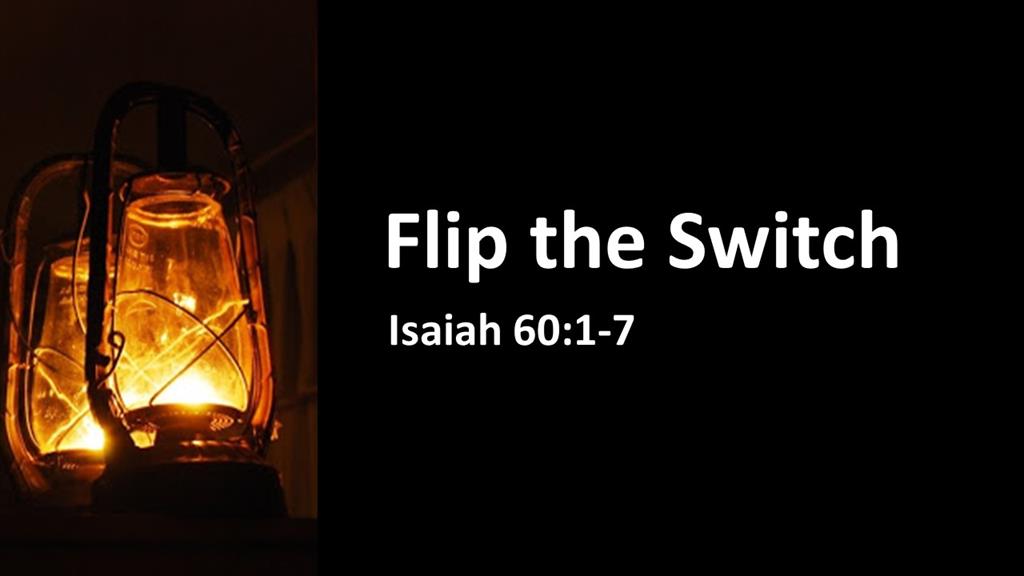
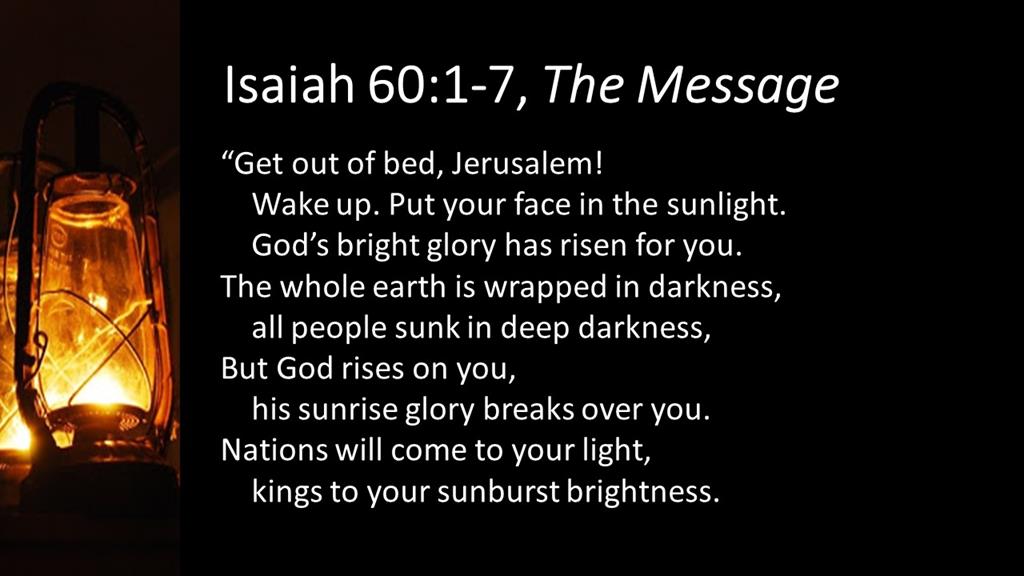
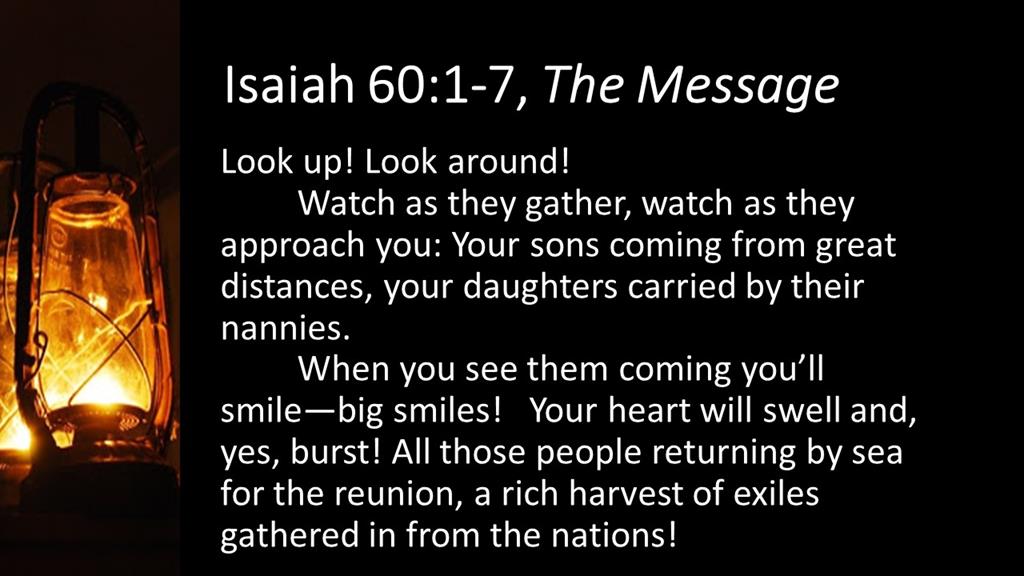
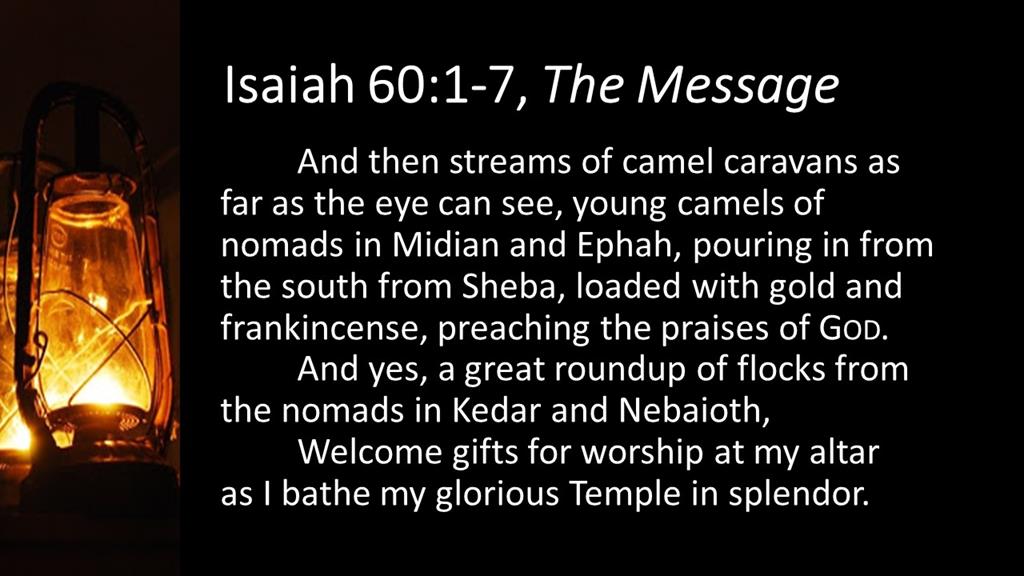
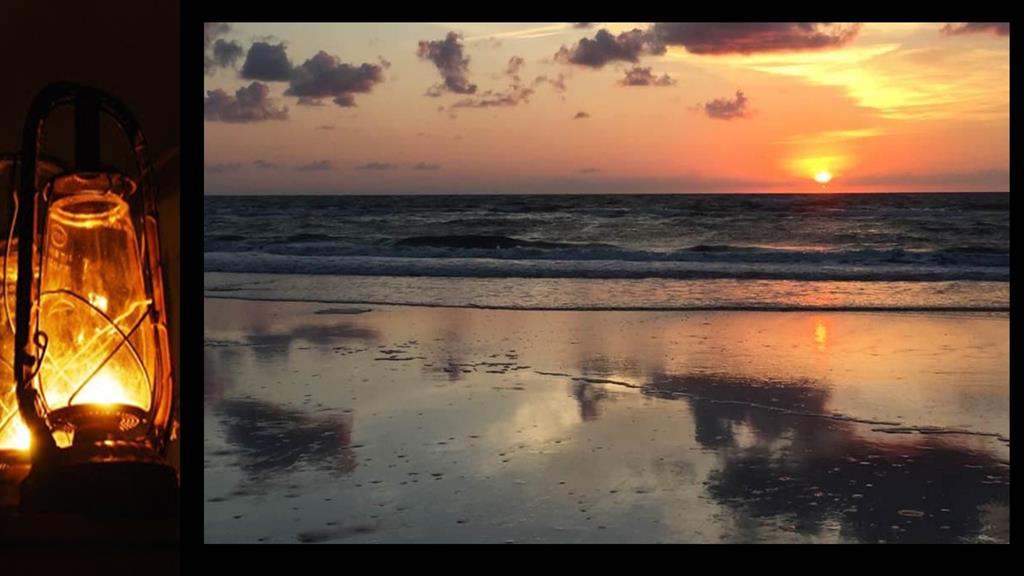 I was blessed as a child to spend many days camping on an undeveloped beach, generally in the fall of the year when the bluefish were running. We’d crawl out of our sleeping bags while it was still dark and start a small fire on the beach to drive away the chill. You could only make out everyone’s shadows created by the light of the fire or lantern. Before the stars began to disappear and the sky lightened, we’d have a line in the water, baited with cut mullet. You’d cast the line out beyond the surf, hoping you were in a good spot. Gradually, the shades of black and gray would be replaced by color as we shivered in the chill and held our rods high, an index finger touching the line waiting for the signature bump of a fish.
I was blessed as a child to spend many days camping on an undeveloped beach, generally in the fall of the year when the bluefish were running. We’d crawl out of our sleeping bags while it was still dark and start a small fire on the beach to drive away the chill. You could only make out everyone’s shadows created by the light of the fire or lantern. Before the stars began to disappear and the sky lightened, we’d have a line in the water, baited with cut mullet. You’d cast the line out beyond the surf, hoping you were in a good spot. Gradually, the shades of black and gray would be replaced by color as we shivered in the chill and held our rods high, an index finger touching the line waiting for the signature bump of a fish.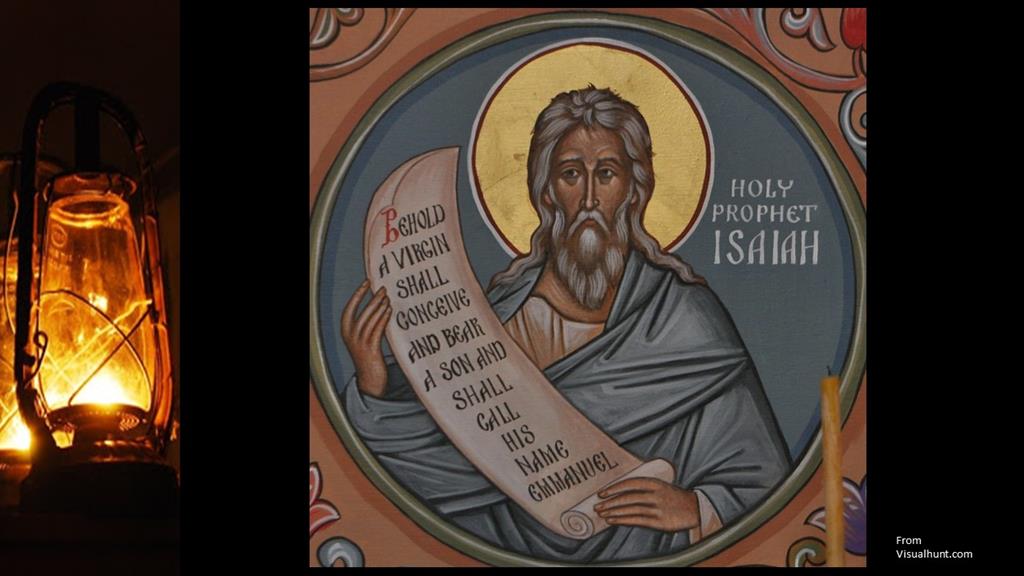 You know, the Prophet Isaiah had a lot of depressing things to say. He wrote about the fall of Israel and the coming exile for Jerusalem. War and destruction is at the forefront of his message, but occasionally Isaiah breaks out of the darkness. In Chapter 9, he writes, “The people who walked in darkness have seen a great light,”
You know, the Prophet Isaiah had a lot of depressing things to say. He wrote about the fall of Israel and the coming exile for Jerusalem. War and destruction is at the forefront of his message, but occasionally Isaiah breaks out of the darkness. In Chapter 9, he writes, “The people who walked in darkness have seen a great light,”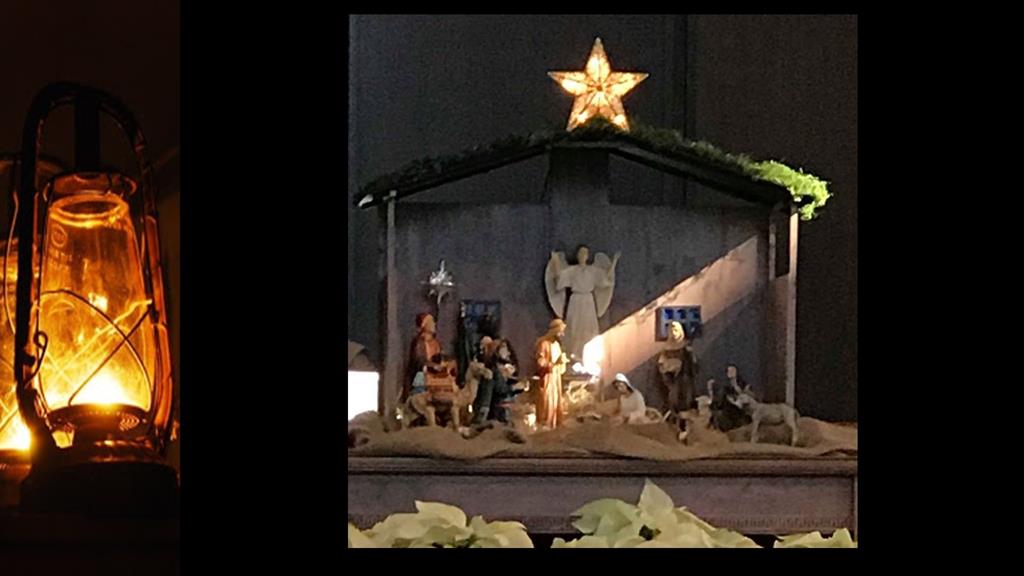 As Christians, we read these passages through the lens of Jesus, the light coming into the world as proclaimed in John’s gospel.
As Christians, we read these passages through the lens of Jesus, the light coming into the world as proclaimed in John’s gospel.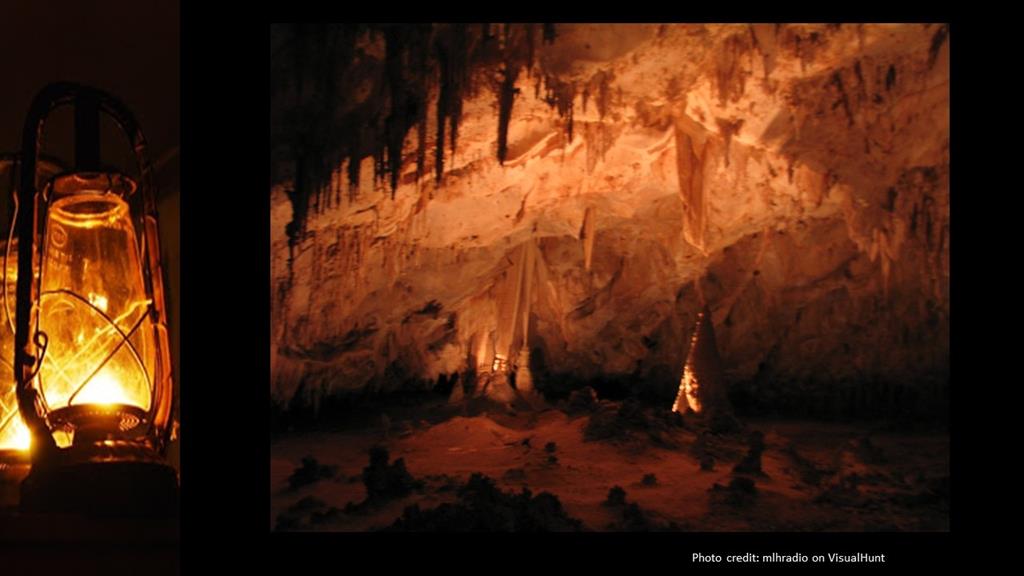 Years ago I had the opportunity to spend a few days spelunking (or caving) in eastern West Virginia. It was an incredible experience. When you are below ground like that, there is no light at all. Turn off your light and you can’t even see your hand in front of your face. At one point, we gathered in a huge underground room. Our guide had us place our cameras on tripods and to open the shutters, then had us go around the room popping flashes. Each splash of light would illuminate a section of the wall and ceiling, which we didn’t see until after the film was processed (these were the old days, long before digital). By bringing light into this cave, we got to experience on film the incredible beauty of this huge underground chamber that was dotted with crystals.
Years ago I had the opportunity to spend a few days spelunking (or caving) in eastern West Virginia. It was an incredible experience. When you are below ground like that, there is no light at all. Turn off your light and you can’t even see your hand in front of your face. At one point, we gathered in a huge underground room. Our guide had us place our cameras on tripods and to open the shutters, then had us go around the room popping flashes. Each splash of light would illuminate a section of the wall and ceiling, which we didn’t see until after the film was processed (these were the old days, long before digital). By bringing light into this cave, we got to experience on film the incredible beauty of this huge underground chamber that was dotted with crystals. This is what we as Christians are to be doing, bringing light into the world. Yes, there are problems. There are evil people who do terrible things, like the Iranian general who was just killed. There are hateful people who want to wipe others off the face of the earth. There are dishonest people who will lie and cheat to get ahead. There are misguided people who create chaos and whom try to profit at the expense of others. We live with partisan hatred in our own country and under the threat of terrorist attacks, both domestic and foreign. The possibility of war is always on the horizon. But despite all that, as believers in the one who came into a troubled world as a child, the one who was willing to die for our sin, the one for whom the grave could not hold, we have hope. There is much that’s good and beautiful in the world which, like that wall inside a cave, only needs a little light to shine upon it. That’s our job, to point people to all that’s good in the world and to what God is doing through his son, Jesus Christ.
This is what we as Christians are to be doing, bringing light into the world. Yes, there are problems. There are evil people who do terrible things, like the Iranian general who was just killed. There are hateful people who want to wipe others off the face of the earth. There are dishonest people who will lie and cheat to get ahead. There are misguided people who create chaos and whom try to profit at the expense of others. We live with partisan hatred in our own country and under the threat of terrorist attacks, both domestic and foreign. The possibility of war is always on the horizon. But despite all that, as believers in the one who came into a troubled world as a child, the one who was willing to die for our sin, the one for whom the grave could not hold, we have hope. There is much that’s good and beautiful in the world which, like that wall inside a cave, only needs a little light to shine upon it. That’s our job, to point people to all that’s good in the world and to what God is doing through his son, Jesus Christ.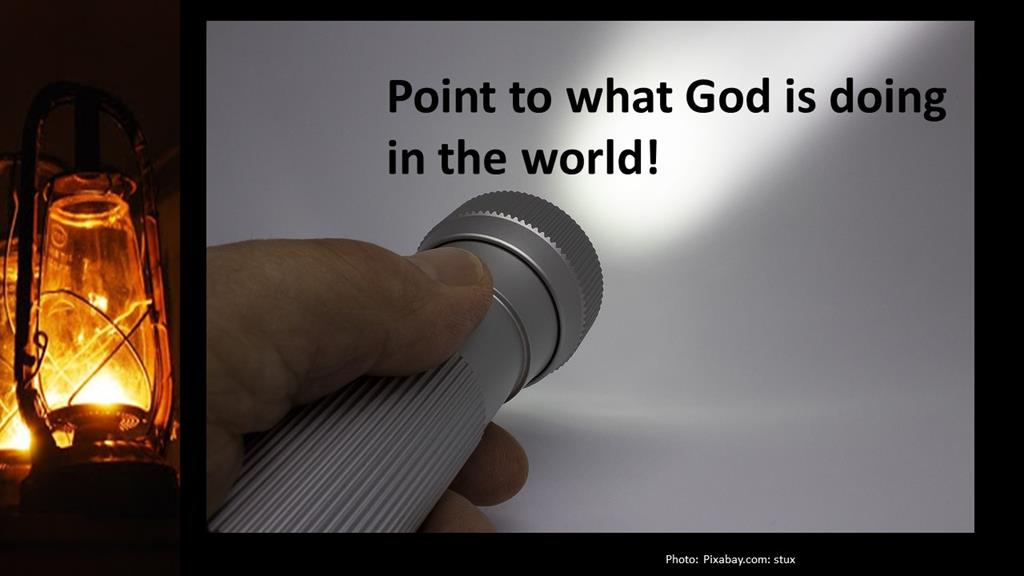 As we enter a New Year, flip the switch and be the light of the world. Hold tight to the faith we have and share the hope that in Jesus Christ, God has things under control. The good news is that we’re not alone as this New Year begins. Remember the truth of the Psalmist, “Weeping may linger for the night, but joy comes with the morning.
As we enter a New Year, flip the switch and be the light of the world. Hold tight to the faith we have and share the hope that in Jesus Christ, God has things under control. The good news is that we’re not alone as this New Year begins. Remember the truth of the Psalmist, “Weeping may linger for the night, but joy comes with the morning.